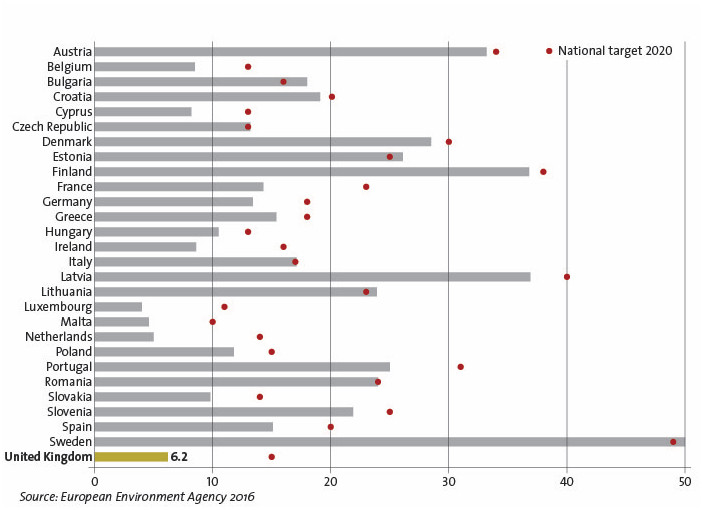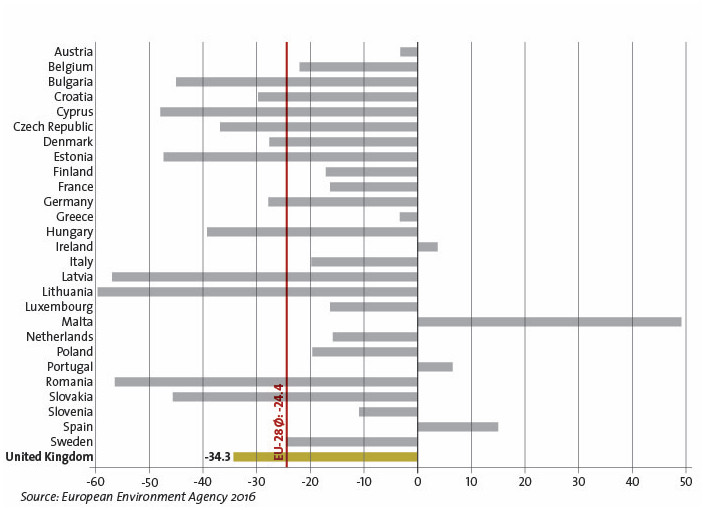Brexit: Implications for the EU´s Energy and Climate Policy
18 Oct 2016
By Severin Fischer and Oliver Geden for Center for Security Studies (CSS)
This article was originally published by the Center Security Studies (CSS) in the Analyses in Security Policy series in October 2016.
The UK’s withdrawal from the EU will have a considerable impact on the community’s energy and climate policy. Having lost an important actor, the EU must rebalance the interests of its member states in this policy field. Crucial legislative decisions are expected to be delayed by this move.
Ever since a majority of UK voters on 23 June 2016 chose to leave the EU, “Brexit” has become the dominant topic of EU politics. The departure of a member state from the EU is a novel phenomenon in the community’s history. The procedure – only outlined in rudimentary form in the EU treaties – begins with a notification of the intent to leave under Article 50 of the Treaty on European Union, followed by a two-year negotiation process, an announcement of the decision to withdraw, and the realignment of the country’s relationship with the EU. It is therefore to be expected that during this transitional phase, the decisionmaking ability of both sides concerning regulations for specific policy fields will be severely curtailed. The effects will be felt very acutely in the area of energy and climate policy, since the coming months will see intense debates on the design of the “Energy Union”. The outcome of these processes will largely be determined by the legal status as well as the next moves of the British government, which has hitherto been strongly engaged in this particular policy field.
The Role of the UK
It is nearly impossible to understand EU energy and climate policy today, in terms of its focal areas and steering instruments, without considering the influence that various UK governments have had over the course of the past decades. Three core areas of British influence can be identified: Liberalization, climate protection, and the preservation of national control over the energy mix. Already in the 1980s, the EU Commission was supported by the UK in its efforts to push back against state intervention in the corporate energy sector, to facilitate a transnational electricity and gas market, and to promulgate effective regulations for a level playing field to foster competition. London also supported the appointment of independent regulatory authorities for the power and gas sectors, as well as the unbundling of grid and generation activities.
The UK similarly championed climate protection as a prominent pillar of EU policies. The country’s role in climate policy was marked by a push for ambitious emissions reductions targets within the EU as well as tenacious engagement in the international climate talks. While London blocked the introduction of an EU-wide CO2 tax over many years, British actors did have a key role in shaping the EU emissions-trading scheme.
Although energy and climate issues are important topics in the UK’s policy towards the EU, London pushed back against the influence of the Commission in this policy field, too, accompanied by constant insistence on national sovereignty in this matter. This was particularly true for technology-specific frameworks (renewable energy, energy efficiency) and the EU Commission’s attempts to influence the energy mix. That position manifested itself in the rejection of binding targets for the roll-out of renewables at EU level or the UK’s decision to float a national funding system for the construction of new nuclear power plants.
The British government’s advocacy of these positions has in the past always required it to forge flexible alliances with other EU member states. This was illustrated most recently in the negotiations on the EU’s energy and climate targets for 2030, which were agreed at a summit of heads of state and government in October 2014. Together with Germany and France, the UK pushed for the most ambitious emissions reduction target possible and advocated a reform of the emissions trading system. At the same time, London built an alliance with Central and Eastern European governments to avert mandatory targets for renewable energy and energy-efficiency policies that would be binding on member states. Without the UK’s influence, the new target architecture for 2030 with its inherent compromise formulae would have been designed differently. For the upcoming negotiations, which will determine how the decisions of the summit are implemented as legislative acts, the key issue is whether London will continue actively to lobby for its own positions in the Council, even though the respective legislation will not be applied in the UK for the foreseeable future, or whether London will abstain in matters affecting the long-term development of the EU.
Share of Renewables in Final Energy Consumption, 2014 (in per cent)

Shifting Balances
The EU Commission has designated 2016 as the year of delivery for the Energy Union. Accordingly, it comes as no surprise that a number of relevant legislative projects are being initiated, some already in 2016 and some scheduled for spring of 2017. Because of their long-term significance extending forward to 2030, any planning decisions in this field are critical for the future of the EU’s energy and climate policies. Of equal significance, then, will be the British strategy of influencing the EU’s legislative procedures in the field of energy and climate: Will the country actively lobby for, and attempt to assert its positions in the Council of Ministers? Or will the UK step back from influencing EU policy-making processes, followed by a shift in the power balance within some dossiers?
Security of gas supply: Already in February 2016, the EU Commission had proposed an update to its Security of Gas Supply Regulation and a decision on how to manage bilateral intergovernmental treaties between member states in the energy field. Both proposals have the same two aims: To improve the management of solidarity in cases of disruptions of supply during crisis situations, and to achieve greater transparency regarding the effects of deals between member states and suppliers outside of the EU, especially Russia. The UK, which is both the second-largest producer of gas in the EU and an important trading emporium for the commodity, has in the past always insisted on market-based solutions and adding flexibility of supply through market integration. The Commission is thus losing an important partner in this area, as London has been opposed not only to state intervention in the gas markets of Central and Eastern Europe, but also to the close bilateral relations in the gas trade between Berlin, Paris, and Moscow. When it comes to security of supply, an important factor will be the extent to which the UK gas market remains connected to and integrated with the EU’s internal gas market following the country’s exit from the community.
Electricity market design: The UK, acting together with the EU Commission, has also played a key role in the creation of the EU’s internal electricity market. The British Electricity Market Reform program of 2015 will most likely be a point of reference for the Commission’s plans to reform the EU’s electricity market at the end of 2016. A core element will be the retention of the current functionality of the electricity market, to be complemented by market-based solutions for integrating renewable energy and improved security of supply, even as other governments debate a fundamental paradigm shift in the design of the electricity market. The UK measures for electricity market design and the introduction of a capacity market (i.e., plant operators are only paid for the capacity they make available, irrespective of the electricity that is effectively sold) were the first such model to be approved by the Commission following regulatory scrutiny. Although the UK electricity market may not be of great importance for the functioning of the continental market in technical terms, the EU Commission will still lose an important ally in matters of regulatory design. Policy approaches involving greater state intervention are likely to gain importance.
Emission Reductions by EU States (CO2 Equ.), 1990 – 2014 (in per cent)

Renewable Energy Directive: The conflict between Germany and the UK over a continuation of the renewable energy policy, with binding national targets extending to 2030, resulted in a compromise formula attained in October 2014: The EU is to commit itself to achieving a 27 per cent share of renewables in total energy consumption by 2030, but without mentioning of mandatory national targets. The Commission has announced draft legislation on this topic for late 2016. Even though the UK’s withdrawal eliminates a key opponent of the EU’s renewable energy policy, Germany still lacks the support it needs to enforce a more binding interpretation of the 2014 compromise formula. Despite the question of multi-level governance in the renewables legislation, a departure of the UK from the EU would make it easier to achieve the goal of 27 per cent renewables, since the UK share, in which renewables are disproportionately underrepresented (cf. Ill. 1) would be eliminated from the overall calculation. At the same time, currently, there is no majority among the member states to support raising the EU target.
Climate policy: Although the UK has for many years had a disproportionately low rollout rate for renewable energy, London has always been a model student when it came to emissions reduction. This can also be seen in the national climate balance sheet. With its emissions reduction of 34 per cent (achieved between 1990 and 2014), the UK is significantly above the EU average of 24 per cent (cf. Ill. 2). The two pieces of draft legislation already presented by the Commission, which relate to the readjustment of emissions trading and to national targets in the areas not covered by emissions trading (transport, buildings, agriculture, and forestry), were in principle supported by Whitehall. However, one vexing issue for the future will be how the EU can achieve its target of reducing emissions by 40 per cent by 2030 without the UK on board. While a cooperation agreement on emissions trading is feasible, London will hardly continue to participate in the pursuit of national targets that go beyond emissions trading in the framework of EU legislation. Getting the other member states to carry a commensurately larger share of the burden to compensate for a British departure would require a very difficult negotiating process. If a precise recalculation were undertaken, the numbers in the EU’s climate goal would have to be adjusted downwards, since the UK’s achievements in the field of emission mitigation far exceed the EU average. However, for the EU as a pioneer in climate protection, defining a post-Brexit climate goal of 38 to 39 per cent renewables would send out a troubling signal that would damage the community’s reputation internationally. However, if the 40 per cent target were retained – in an effort to save political face –, the EU-27 would have to step up their efforts. Inevitably, this would set off conflicts over resource allocation among the member states.
Governance of the “Energy Union”: Following the decisions of the European Council in October 2014, the aim of the “Energy Union” is to be underpinned with a robust governance tool designed to achieve a restructuring of the relationship and shared responsibilities between the member states and the Commission in the field of energy and climate policy. In particular, clarification is required regarding the binding nature and enforceability of the Commission’s oversight rights vis-à-vis national policies. In this context, the UK had advocated a “light touch” – a position that will now lose its main supporter. The British departure from the EU could significantly expand the latitude of the Commission, as Germany and France in particular want to give the EU Commission greater oversight of common policies with regard to environmental and climate goals, as well as Poland and Central and Eastern European States aim for the same regarding security of supply issues.
A survey of the imminent legislative procedures in the EU energy and climate policy field shows that the British departure will most likely lead to considerable, but unbalanced shifts in the centers of gravity. While the liberal, market-based approach could be weakened in the fields of both electricity and gas, there is a chance that the Commission could improve its oversight of common activities within the Energy Union.
The Future of EU-UK Relations
- European Economic Area (EEA) membership: Members of the EEA have full access to the EU’s single market; however, this also requires guarantees of the four basic freedoms. In the sphere of energy and climate policy, membership in the EEA would be predicated on the implementation of a number of EU internal market norms, without involvement in their design.
- Accession to the Energy Community: The Energy Community so far includes the EU and neighboring states in the Western Balkans and Eastern Europe (Ukraine, Moldova). Its purpose is to expand the EU common energy market and to establish compliance with regulations originally required for EU membership. As such, the Energy Community formally implements the single-market regulations previously established by the EU, but does so as a group of nominally autonomous actors.
- Bilateral treaties: Just like relations between the EU and Switzerland to date, future EU-UK relations could also be governed by a series of bilateral treaties. Nevertheless, the partners will have to agree on shared institutions. The EU will require guarantees of the “four freedoms” as a precondition for access to the common market.
Effects on Switzerland
Switzerland will be only indirectly affected by the UK’s departure from the EU when it comes to energy and climate policy. In the run-up to the decisive Brexit vote, it was the Yes camp that repeatedly cited the case of Switzerland as a possible alternative model for the future relationship between London and Brussels. However, while Swiss-EU relations could indeed be seen as a potential prototype in the area of climate policy, notably with respect to the plans for linking of emissions trading systems, there is so far no comparable bilateral treaty when it comes to the energy sector. Such a treaty would give Swiss companies unlimited access to the European electricity market and permit more efficient operations of cross-border interconnectors. An agreement in this area has been under negotiation for several years. However, the implementation of the Swiss federal popular initiative “Against Mass Immigration” of 2014 and other ongoing institutional questions remain unresolved. Given these uncertainties, the conclusion of an energy treaty has been deferred for some time now by the EU Commission and is unlikely to be reconsidered any time soon.
Another hope, frequently voiced in the Swiss domestic debate, is that relations with the EU could be negotiated jointly with a post-Brexit UK; this expectation appears to be similarly misguided. Neither the EU Commission nor the UK have any interest in further complicating the already difficult bilateral negotiations by involving a third party in the proceedings. A separate negotiation process will have to be pursued between Switzerland and the EU at some point in the future.
On the contrary: The departure of the UK from the EU and the renegotiation of relations between the two partners might in fact turn into an additional problem for Switzerland. For even if a solution might be found regarding the freedom of movement problem, the prospect of a Brexit has considerably dampened the EU Commission’s enthusiasm for concluding the negotiations over an energy treaty. This is because the EU Commission has little interest in the symbolic effect that any such bilateral agreement would signal, given that it might prejudice the outcome of negotiations with the UK. Switzerland should be aware that in the energy sector, any renewal of the EU’s bilateral relations with Berne will have to wait until after the UK’s withdrawal and a clarification of the future relationship between Brussels and London.
About the Authors
Dr Severin Fischer is a Senior Researcher at the Center for Security Studies (CSS) at ETH Zurich. He is the author of several publications, including «An Energy World Order in Flux» (2016).
Dr Oliver Geden is Head of the Research Division EU/Europe at the German Institute for International and Security Affairs (SWP) in Berlin. Among other publications, he co-authored «The EU’s Policy to Secure Gas Supplies» (2014).
For more information on issues and events that shape our world, please visit the CSS Blog Network or browse our Digital Library.

